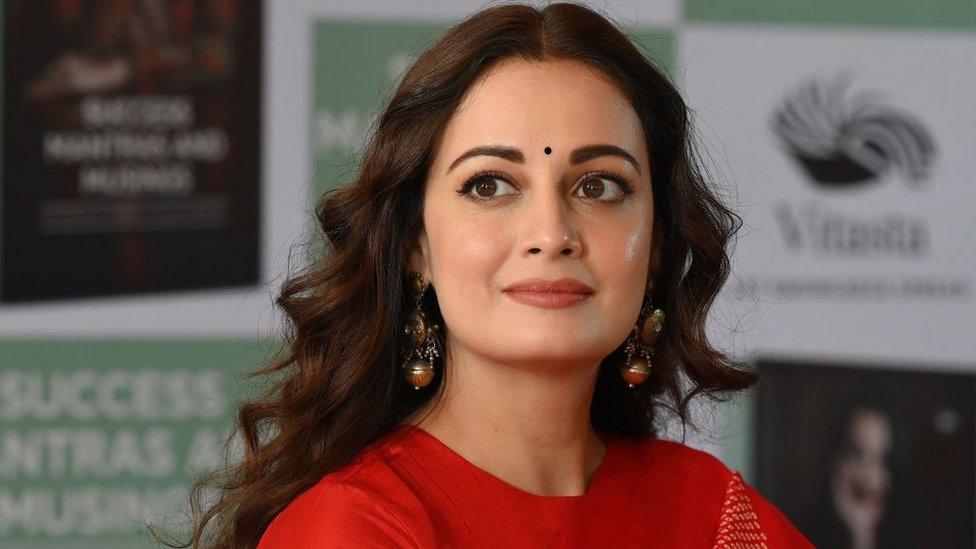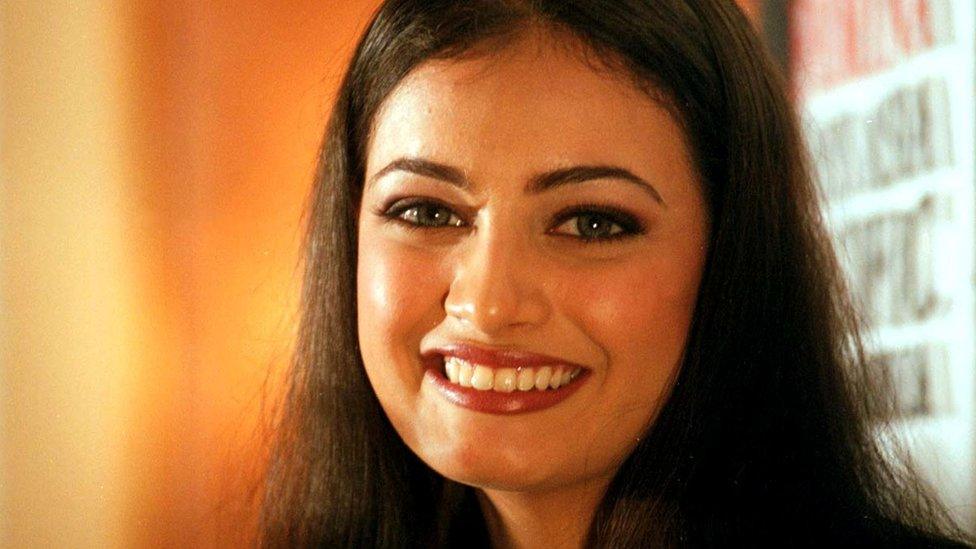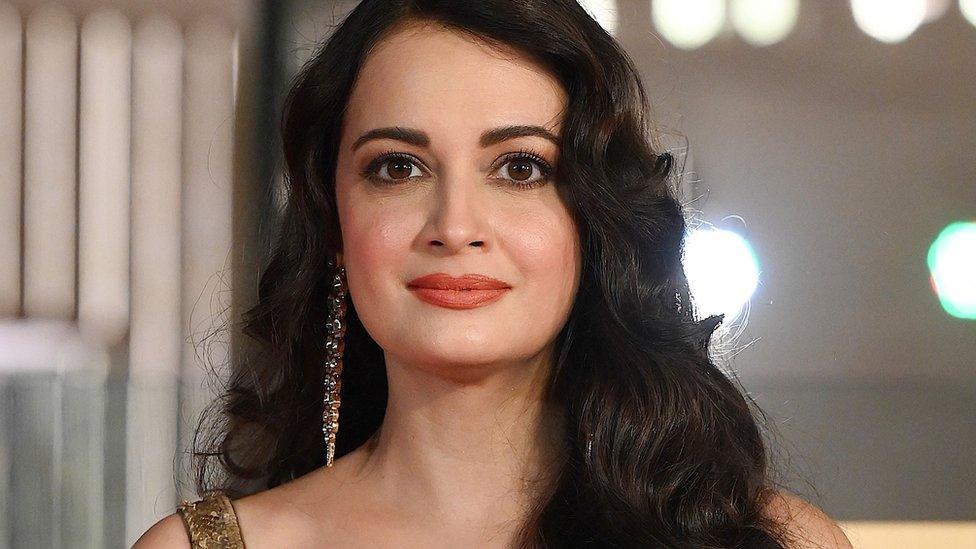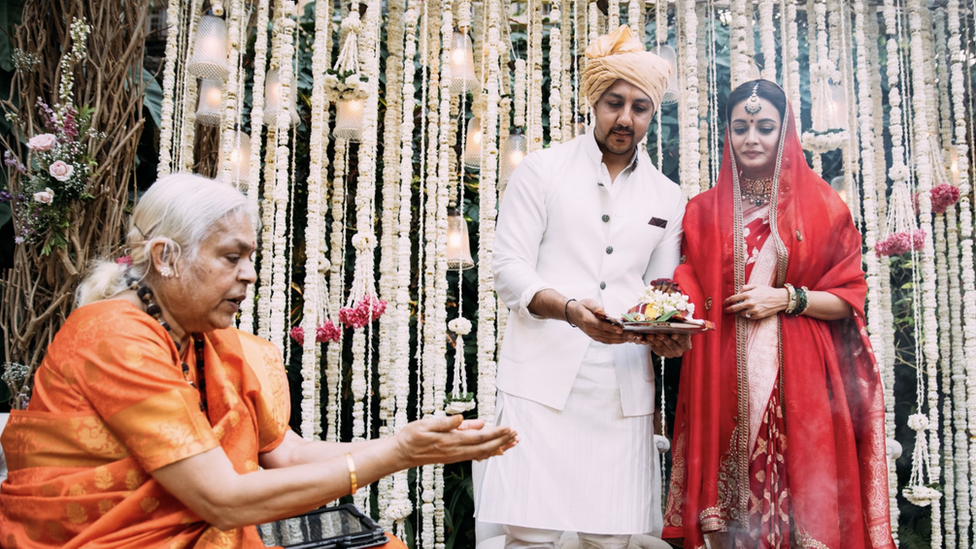Dia Mirza: The biggest climate issue is egotistical men
- Published

Dia Mirza has starred in Indian cinema for more than 20 years
When you're a famous Bollywood actress you attract attention wherever you go.
Sometimes Dia Mirza can use that attention to her advantage, like when it comes to campaigning about climate change, the cause she is most passionate about.
But sometimes it creates problems.
In the middle of our interview for BBC 100 Women, just as she's discussing the causes of climate change, there is a ring on the bell of the hotel room door.
The staff, learning that she was here, have made a collage of photographs of Mirza, and have come to the door to present the gift.
She's quick to accept the offering politely and as soon as they have left, she resumes making her point.
"The biggest climate issue is a bunch of egotistical men who refuse to change," she says, referring to the heads of multinational corporations.
"The polluters know their choices are killing our planet and our people, so there are really no excuses for them not to change."

Mirza's career began when she was a contestant in beauty pageants
Mirza is one of the women featured on this year's BBC 100 Women list, which each year names 100 inspiring and influential women around the world.
In 2023, the list is shining a spotlight on women tackling climate change.
Born and brought up in southern India, surrounded by nature, it was not surprising that Mirza embraced climate activism, even as her career in modelling and films was taking off 20 years ago.
She became a United Nations goodwill ambassador in 2017, speaking out on behalf of the UN's Environment Programme.
During the interview she repeatedly harks back to the days of her childhood, when clothes were always handed down from one generation to the next and there was no shame in reusing items year after year.
It's a practice she says she has revived at home, for example at her son's recent second birthday celebrations, which she planned as a zero plastic, zero waste party. All decorations have been saved for reuse at future events.
"It is necessary to walk the talk and lead by example," she says more than once.
Mirza refuses to use the plastic water bottles served by the hotel, choosing her own metal bottle instead.
"How can I advocate for sustainable living if I don't practise it myself?" she asks.

Mirza says motherhood gives her the chance to shape future generations
Much of our conversation focuses on gender equality both in relation to climate change but also about her experiences as a film star.
Mirza was just 19 when she won the Miss Asia Pacific beauty pageant title in 2000.
Reflecting back on that time, Mirza advises, "Never let anyone objectify you.
"I refused to wear two piece swim suit during the Miss Asia Pacific contest as I was not comfortable."
She soon began to pursue a career in modelling but an industry insider told her she was possibly too pretty and too fair and almost certainly too short to be model.
"I don't think I was as affected by what he said as I was impacted by the fact that somebody who knew nothing about me was putting me in a box and was deciding for me what it is that I should or should not do," says Mirza.
Throughout her career, she says she has experienced sexism.
"Allowances [were made] for my male counterparts for being late, being unprofessional and just the kind of hierarchy on a film set at the time was totally patriarchal, and there were so few women on set when I started working," she says.
"We didn't even have toilets for female actors on outside locations."

Mirza and her husband broke with some traditions at their wedding
Despite her early experiences, Mirza is positive about the future and says there are signs that things are improving.
"There was a phase in Indian cinema when women beyond a certain age were not offered the lead roles," she says, pointing out that men would still get leading roles even when they were no longer young.
"We've just released a film called Dhak Dhak, which is a beautiful story about four women from four different age groups who take a motorbike ride.
"It's also only taken the Indian film industry 110 years to tell a story like this. And I've waited 23 years to play a part like this."
Outside of the film industry, Mirza is keen to champion gender equality in other areas too.
In 2021, she got married in a traditional Indian ceremony with a marked difference. Unlike most weddings, her officiant was a female priest .
"I was very impressed with the way the female priest performed the rituals in my friend's wedding," says Mirza.
"And I knew I wanted the same.
"This decision to have a female priest led to a huge online debate in India as to why women are still not allowed to perform certain duties, including being a priest."
This was not the only tradition she broke. She also refused to follow the ritual of Kanyadaan in her wedding, a moment where the bride is given away by her father.
"My maternal grandfather used to say that his daughters were not an object that he could 'give away' in marriage," says Mirza.
"This is a very powerful thought. My mother also said that the ritual of Kanyadaan would not be performed during my wedding."
Dia Mirza: The biggest climate issue is egotistical men
As a Bollywood reporter, l have followed Mirza's career.
People tend to focus on the glamour and glitz and do not always take into account her commitment as a climate campaigner.
There's a sense of desperation whenever we speak of the damage that has been done to the environment.
"Right now, I'm feeling a little despondent because of what's happening everywhere in the world," she says.
"But I draw hope and inspiration from young people, their innovations, their solutions, their advocacy, but most importantly, their empathy and their love."
As Dia waits for the interview to finish so she can be reunited with her son, who is waiting downstairs, I ask her one last question.
Out of the multiple roles she has as an actor, climate campaigner and UN ambassador, which is the one dearest to her heart?
"Being a mother," comes the quick reply. "I have the opportunity to shape the future generations of the world."
Additional reporting by Amelia Butterly

BBC 100 Women names 100 inspiring and influential women around the world every year. Follow BBC 100 Women on Instagram , externaland Facebook, external. Join the conversation using #BBC100Women.